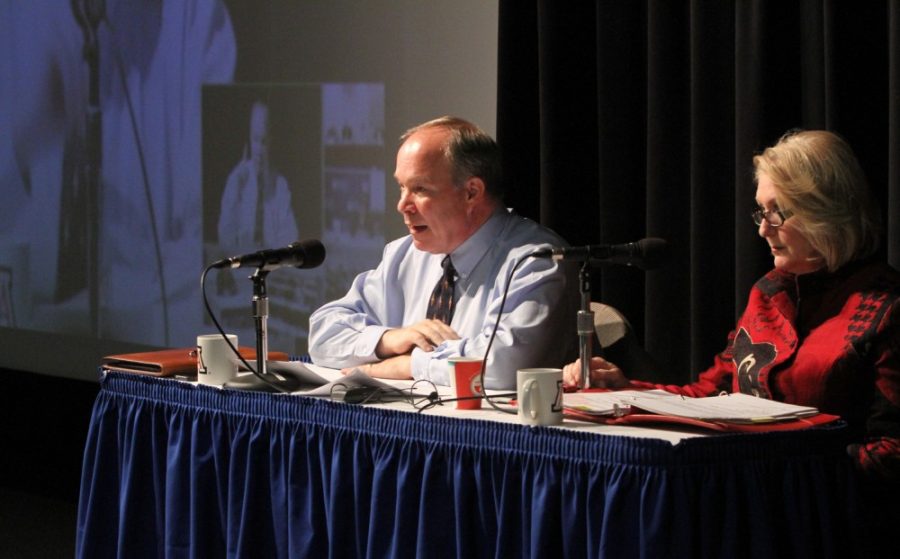UA President Ann Weaver Hart’s proposal for a 3 percent increase in tuition, in addition to an $80 library fee, drew mixed reactions from students Wednesday night.
The Arizona Board of Regents held a public hearing to gather student input before the regents vote in April on tuition for the 2013-14 school year.
Hart’s proposal includes a base tuition increase of 3 percent for graduate, undergraduate, resident and nonresident tuition. Residents and nonresidents in the College of Medicine would also see a 3 percent increase.
Tuition for College of Law students, however, would be reduced by 20 percent for residents and 27 percent for nonresidents. Hart also requested an increase in investments and in UA employees, as well as an $80 library fee.
The tuition increases will generate about $10.8 million from continuing students, Hart said.
Katy Murray, student body president for the UA, was the first student to speak about the new tuition proposal.
“On behalf of the 40,000 students at our university … we have carefully looked over the plan that President Hart has put forth, and we are willing to stand by her side in supporting that plan,” Murray said. “But with that being said, it’s also very important, from the student perspective, to realize that that is the absolute maximum that we are able accommodate at this time.”
Although she spoke in support of the 3 percent increase, Murray said that students are not able to support the $80 library fee.
Murray also expressed disappointment that student body leaders were not allowed to sit at the table with decision makers this year, unlike in many tuition hearings prior.
“This year we’ve made a subtle change,” said Rick Myers, chairman of the board of regents, during his introduction for the hearing. “The reason for that is this is a formal regents meeting where we’re being given testimony about tuition, and the student government leaders represent the students. … We really felt that this year to highlight that, they’re sitting in the audience.”
However, Murray said the change was discouraging.
“I truly believe that on behalf of students, it really is disheartening to see that we don’t have a seat this year,” Murray said. “We really, really would love for you to reconsider that next year, because at this point, we as students are really worried about what the future would look like between our relationship with the regents.”
Zachary Brooks, president of the Graduate and Professional Student Council, said he was very disappointed that students did not have a seat at the decision table.
“The students you recruit at [UA] and the other universities, you recruit and you train, and you say ‘You’re going to be the best students in this state,’ you will not even have those students sit on a stage with you as you consider a tuition fee increase,” Brooks said. “It’s not a subtle change; it’s very big.”
However, Brooks also said he was in support of the library fee.
“In an ideal world, there would be no need for tuition fee increases,” Brooks said. “But we live in a real world and we realize that a lot of these tuition … increase proposals are because of the cuts to the state of the last five or six years.”
Anthony Carli, the Associated Stuents of the University of Arizona Academic Affairs director and a marketing junior, said students can swallow the 3 percent increase, but that it will only treat the symptom of the problem, not the cause.
“What any increase tells students is the fact that the bleeding is not going to stop anytime soon,” Carli said.
The meeting was an opportunity for the board of regents to listen to students and members of the public give feedback and comment on events at the universities and their budgets, according to Myers. Students from Arizona State University and Northern Arizona University campuses joined the meeting and shared their comments through a live video feed.
“I just want everyone here to know that there’s been tremendous effort at the universities in the last five years, working on efficiency and doing everything they can to provide an absolutely high quality education,” Myers said.









